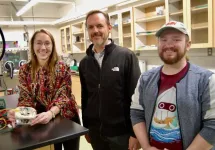(Press-News.org) The evidence on the use of puberty blockers and hormones for children and young people experiencing gender related distress is wholly inadequate, making it impossible to gauge their effectiveness or their impact on mental and physical health, find two systematic reviews of the available research, published in the Archives of Disease in Childhood.
Of the 50 studies included in the review looking at the effectiveness of puberty blockers for gender questioning teens, only one was of high quality, leading the authors to conclude that although most of the studies suggested that treatment might affect bone health and height: “No conclusions can be drawn about the impact on gender dysphoria, mental and psychosocial health or cognitive development.”
Similarly, of the 53 studies included in the review on the use of masculinising and feminising hormones, only 1 was of sufficiently high quality, with little or only inconsistent evidence on key outcomes, such as body satisfaction, psychosocial and cognitive outcomes, fertility, bone health and cardiometabolic effects.
Equally concerning is that most of the 23 clinical guidelines aren’t independent or evidence based, concludes another review in the series. The links between the evidence and the recommendations are often unclear, and largely informed by two international guidelines (World Professional Association for Transgender Health and Endocrine Society) which themselves lack scientific rigour, say the authors.
A fourth review notes that while the guidelines agree on the need for psychosocial support, there’s no consensus on who should be involved in providing this, or whether provision should be different for children and teens. And there’s virtually no guidance on how best to support those who’ve not yet reached puberty or whose identity is non-binary.
The reviews comprise a series commissioned from the University of York to inform today’s independent review into specialist services for the increasing numbers of children and young people referred with gender dysphoria—distress caused by a mismatch between birth sex and gender identity.
In an interview with The BMJ ahead of the report’s publication, Dr Hilary Cass, its author, points out that there’s no evidence to suggest that puberty blockers help children and young people “buy time to think” or improve their psychological wellbeing.
“The only thing that we can tangibly say is that, particularly for the birth registered males, if you stop them breaking their voice and growing facial hair, then they may pass better in adulthood. But even that is not without qualification,” she explains.
Cass also acknowledges that there was a point when “practice did deviate from the clinical evidence” and adds “there unfortunately is no evidence that gender affirming treatment in its broadest sense, reduces suicide risk.”
She believes young people have been “let down” by the health system and society and insists that gender questioning children and young people seeking help from the NHS must be able to access a broad-based holistic assessment delivered by a multi-professional team including paediatricians, child psychiatrists, and allied health experts.
“Having that breadth means you can develop a proper plan and have the right people on hand to deal with it,” she says.
Asked what she would say to children and young people, their families and carers, she replies: "We need to listen to them. We need to explain the weaknesses of the evidence. But most importantly, we need to find ways to help them feel better about themselves so that they're not going to be so distressed.”
In an opinion piece for The BMJ, the dearth of good quality evidence prompts Cass to conclude that gender medicine is “built on shaky foundations.”
She explains how care will now be delivered through a network of regional centres working collaboratively to the same clinical protocols, with research and data collection embedded from the outset.
“Regardless of whether or not [children and young people] choose a social or medical transition in the longer term, they need support to help them thrive and fulfil their life goals,” she writes.
“I very much hope that this strong multidisciplinary team model, with networked service delivery and embedded research will encourage more clinicians with experience in child and adolescent health to work in this evolving area of clinical practice,” she concludes.
In a linked editorial to accompany the reviews in Archives of Disease in Childhood, Dr Camilla Kingdom, outgoing President of the Royal College of Paediatrics and Child Health, explains: “This group of children and young people are particularly vulnerable because their health and wellbeing needs are simply not being met.
“We have an overarching holistic approach to the care of babies, children and young people centred on their needs, which until now, has not percolated through to gender service provision. We now have an important opportunity to make up for lost time.”
[Ends]
END
Evidence for puberty blockers and hormone treatment for gender transition wholly inadequate
Most clinical guidelines currently in use aren’t evidence based either. Gender medicine “built on shaky foundations,” says Dr Hilary Cass in The BMJ
2024-04-10
ELSE PRESS RELEASES FROM THIS DATE:
The genomic architecture of inherited DNA variants
2024-04-10
You have your mother’s eyes and your father’s smile, but genetics is much more than just what’s on the surface. In a study that spans more than a decade, researchers at Baylor College of Medicine have looked at generations of families in a specific population to reveal the role newly inherited DNA variants play on recessive disease traits, and in the process, they have created a population specific database revealing unique DNA information unseen in larger cohorts.
The findings, now published in Genetics in Medicine OPEN, revealed a correlation between occurrences of complex genetic ...
Baylor College of Medicine wins the 2024 STAT Madness science competition
2024-04-10
Baylor College of Medicine is the champion of the 2024 STAT Madness competition!
Similar to the March Madness bracket-style basketball competition, but focused on science, this national event pits research institutions against each other for the top innovation spot in science and medicine published in the previous year.
This year, 50 institutions across the U.S. sent their candidate studies to STAT Madness, which selected 64 for the competition. The winner is elected by popular vote. After five weeks of voting that gathered nearly 270,000 votes, the Baylor team outdid the Stanford University competitor with 64.8% of the vote ...
AACR: Trio of studies highlights promising early results with new cancer therapies and targets
2024-04-10
ABSTRACTS CT037, CT038, CT042
SAN DIEGO – Three early-phase clinical studies presented by researchers from The University of Texas MD Anderson Cancer Center at the American Association for Cancer Research (AACR) Annual Meeting 2024 show promising initial data for patients with lymphoma, gastric or gastroesophageal junction cancers, and specific molecularly selected tumors. The studies were featured in a clinical trials minisymposium highlighting novel agents and emerging therapeutic strategies. Information on all MD Anderson AACR Annual Meeting content can be found at MDAnderson.org/AACR.
Novel combination with evorpacept demonstrates promising results for ...
When should a surgeon plan for a career shift? New guidelines uphold lifelong competency of surgeons
2024-04-10
As millions of Americans approach age 66, they face the inevitable question, is it time to retire? The physician population is aging alongside the general population – more than 40% of physicians in the U.S. will be 65 years or older within the next decade. In the case of surgeons, there is little guidance on how to best ensure their competency throughout their career and at the same time maintain patient safety while preserving physician dignity.
In a current study published in the Journal of the American College of Surgeons, the American College of Surgeons (ACS) ...
Survival rates after hip or spine fracture worse than for many cancers
2024-04-09
A new article in JBMR Plus, published by Oxford University Press, indicates that patient survival rates after hip or other bone fractures can be very poor. While patients and their families may dismiss a fracture as a minor injury, survival rates can be lower than those for many types of cancer.
Scientists have gathered a body of evidence about mortality outcomes in patients over 50, but survival rates following bone fractures are not often included in the statistics available to patients or caregivers. The aim of this ...
Beating back bitter taste in medicine
2024-04-09
PHILADELPHIA (April 9, 2024) – The bitter taste of certain drugs is a barrier to taking some medications as prescribed, especially for people who are particularly sensitive to bitter taste. Published in Clinical Therapeutics, a team from the Monell Chemical Senses Center found that the diabetes drug rosiglitazone could partially block the bitter taste of some especially bad-tasting medications. Rosiglitazone could be added in small doses to other medicines, to make them less bitter and taste better.
This result provided new information. “To our knowledge, there are no previous reports on the bitter-blocking effect of this diabetes drug,” ...
Heart regeneration pioneer to join UW–Madison, Morgridge Institute
2024-04-09
04/09/2024
CONTACT: Deneen Wellik, wellik@wisc.edu
Heart regeneration pioneer to join UW–Madison, Morgridge Institute
MADISON — A biologist who explores the potential life-saving mechanisms of how organisms regenerate damaged heart and spinal cord tissue will join the University of Wisconsin–Madison and the Morgridge Institute for Research this fall.
Kenneth Poss, presently the James B. Duke Professor of Regenerative Biology at Duke University, explores a research area that has grown ...
Can the bias in algorithms help us see our own?
2024-04-09
Algorithms were supposed to make our lives easier and fairer: help us find the best job applicants, help judges impartially assess the risks of bail and bond decisions, and ensure that healthcare is delivered to the patients with the greatest need. By now, though, we know that algorithms can be just as biased as the human decision-makers they inform and replace.
What if that weren’t a bad thing?
New research by Carey Morewedge, a Boston University Questrom School of Business professor of marketing and Everett W. Lord Distinguished Faculty Scholar, found that people recognize more of their biases in algorithms’ decisions ...
This device gathers, stores electricity in remote settings
2024-04-09
Today wirelessly connected devices are performing an expanding array of applications, such as monitoring the condition of engines and machinery and remote sensing in agricultural settings. Systems known as the “Internet of Things” (IoT), hold much potential for improving the efficiency and safety of the equipment.
Yet stumbling blocks remain for IoT, thwarting many potential applications. How do you power these devices in situations where and when reliable electrical sources are not practically available?
Research from the University of Utah’s College of Engineering points to a possible solution in the form of a novel type of battery called ...
AACR: Video educates and connects men to prostate cancer screening options
2024-04-09
SAN DIEGO – As part of a comprehensive effort to improve cancer screenings among diverse communities, Penn Medicine’s Abramson Cancer Center (ACC) Community Outreach and Engagement team developed a culturally sensitive educational video to address prostate cancer screening disparities. In findings shared today at the American Association for Cancer Research (AACR) Annual Meeting 2024 (Abstract LB371), the team showed that the video increased knowledge about prostate cancer and screening, and reduced uncertainty about obtaining prostate ...
LAST 30 PRESS RELEASES:
Brainwaves of mothers and children synchronize when playing together – even in an acquired language
A holiday to better recovery
Cal Poly’s fifth Climate Solutions Now conference to take place Feb. 23-27
Mask-wearing during COVID-19 linked to reduced air pollution–triggered heart attack risk in Japan
Achieving cross-coupling reactions of fatty amide reduction radicals via iridium-photorelay catalysis and other strategies
Shorter may be sweeter: Study finds 15-second health ads can curb junk food cravings
Family relationships identified in Stone Age graves on Gotland
Effectiveness of exercise to ease osteoarthritis symptoms likely minimal and transient
Cost of copper must rise double to meet basic copper needs
A gel for wounds that won’t heal
Iron, carbon, and the art of toxic cleanup
Organic soil amendments work together to help sandy soils hold water longer, study finds
Hidden carbon in mangrove soils may play a larger role in climate regulation than previously thought
Weight-loss wonder pills prompt scrutiny of key ingredient
Nonprofit leader Diane Dodge to receive 2026 Penn Nursing Renfield Foundation Award for Global Women’s Health
Maternal smoking during pregnancy may be linked to higher blood pressure in children, NIH study finds
New Lund model aims to shorten the path to life-saving cell and gene therapies
Researchers create ultra-stretchable, liquid-repellent materials via laser ablation
Combining AI with OCT shows potential for detecting lipid-rich plaques in coronary arteries
SeaCast revolutionizes Mediterranean Sea forecasting with AI-powered speed and accuracy
JMIR Publications’ JMIR Bioinformatics and Biotechnology invites submissions on Bridging Data, AI, and Innovation to Transform Health
Honey bees navigate more precisely than previously thought
Air pollution may directly contribute to Alzheimer’s disease
Study finds early imaging after pediatric UTIs may do more harm than good
UC San Diego Health joins national research for maternal-fetal care
New biomarker predicts chemotherapy response in triple-negative breast cancer
Treatment algorithms featured in Brain Trauma Foundation’s update of guidelines for care of patients with penetrating traumatic brain injury
Over 40% of musicians experience tinnitus; hearing loss and hyperacusis also significantly elevated
Artificial intelligence predicts colorectal cancer risk in ulcerative colitis patients
Mayo Clinic installs first magnetic nanoparticle hyperthermia system for cancer research in the US
[Press-News.org] Evidence for puberty blockers and hormone treatment for gender transition wholly inadequateMost clinical guidelines currently in use aren’t evidence based either. Gender medicine “built on shaky foundations,” says Dr Hilary Cass in The BMJ




